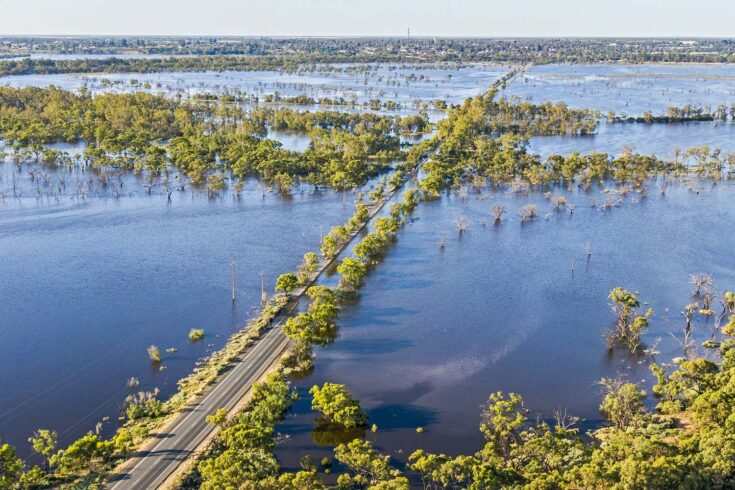Research and direct engagement with negotiators and policymakers at a national and global scale have helped shape targets to strengthen climate adaptation and resilience.
2023 was the warmest year on record as confirmed by the World Meteorological Organization. While measures to tackle the causes of climate change are critical, preparing to deal with the impact of storms, floods, droughts and heatwaves is increasingly important.
In line with the Paris Agreement, many countries around the globe have climate adaptation plans in place which set out the ways in which they are preparing for risks associated with climate change.
However, research revealed that 60% of countries are not tracking the implementation and effect of these plans, creating a false sense of progress. The research was by Dr Timo Leiter from the London School of Economics and Political Science and was funded by the Economic and Social Research Council (ESRC).
In 2022, the United Nations (UN) embarked on the development of a global policy framework for adaptation. Dr Leiter co-facilitated workshops to develop this framework so that countries have clear guidance on how to address climate impacts. Crucially, they included a target, based on Dr Leiter’s research published on ScienceDirect, for monitoring and evaluation of adaptation plans.
Adopted at the UN climate change conference in December 2023, the UN framework increases the accountability of countries and drives implementation of their adaptation plans. As a result, it has the potential to better protect the more than three billion people living in communities that are highly vulnerable to the impacts of climate change (Intergovernmental Panel on Climate Change).
About the project
Adaptation actions can significantly reduce risks caused by a changing climate, bringing economic, societal and environmental benefits. But assessing the impact of these actions is far from straightforward, says Dr Leiter:
Climate adaptations are very diverse; they can include flood defences in the UK, using drought-resistant seeds in Rwanda, or protecting workers from extreme heat in India. Unlike mitigation of greenhouse gas emissions, which is a physical quantity that can be measured, there is no universal metric for climate adaptations.
While the Paris Agreement included a generic goal to prepare for climate impacts through adaptations, there were no clear targets or requirements to monitor progress.
Dr Leiter’s ESRC-funded doctoral studies examined whether and how countries were tracking the implementation of their national adaptation plans and explored the potential and shortcomings of global indicators. Alongside document analysis of policies and plans, his research drew upon insights gained from observing UN climate change negotiations in action. He explains:
A policy document only gives you information about the final decision; it doesn’t provide an understanding of the complex dynamics and politics that are involved in negotiations. You only get that from being in the room.
Based on his research, Dr Leiter was invited to co-design the first comprehensive global assessment of adaptation: UN Environment Programme’s Adaptation Gap report. He co-developed its new assessment framework to track global progress on climate adaptation planning, finance and implementation since 2020. The annual report is endorsed by the UN Secretary General who calls for greater climate action by all governments.
There was criticism of the UK’s National Adaptation Programme by the independent Climate Change Committee (CCC). Following this, Dr Leiter also worked with Department for Environment, Food and Rural Affairs (Defra) to more clearly define UK policy objectives and how they can be achieved by individual government departments.
Impact of the project
Dr Leiter’s research has informed new global targets that help governments implement and monitor climate adaptation and better prepare for climate risks.
Adoption of a new global adaptation policy framework
Through facilitating a series of UN workshops, Dr Leiter contributed to the successful development of the UN’s global policy framework, adopted in December 2023. This sets out 11 targets for countries to better prepare for climate risk.
One of these targets builds directly from Dr Leiter’s research and commits countries to ‘have designed, established and operationalised a system for monitoring, evaluation and learning for their national adaptation efforts’ by 2030.
Dr Leiter’s research, published on Google Scholar, and expertise helped shape the structure of the UN’s global assessment report, says Dr Maarten Kappelle from the UN Environment Programme:
The structure of the Adaptation Gap Report that Dr Leiter co-developed has provided a blueprint for global assessments on adaptation, offering guidance and a tangible, robust and research-based approach that negotiators could draw from during the development of the framework for the Global Goal on Adaptation.
In fact, the framework adopts the key dimensions of planning, implementation and monitoring and evaluation.
Improving the UK’s national climate adaptation plan
As advisor to the climate and evidence division at Defra, Dr Leiter contributed to the implementation of recommendations by the CCC for clearer and more ambitious adaptation targets in the UK.
By providing advice on process and supporting interdepartmental exchange, he helped establish pathways for departments to lay out their adaptation targets. The UK’s Third National Adaptation Programme defines risk reduction goals, actions and delivery for climate risks, better preparing the UK for climate risks and benefitting vulnerable communities across the country.
Mariella de Soissons, Domestic Climate Change Adaptation Policy Advisor at Defra, says:
Dr Leiter’s PhD research, including a global stocktake of monitoring and evaluation systems of national adaptation plans and knowledge of other countries’ policies and lessons learned, have been very valuable to the department.
As a result of his leading advisory role, the team at Defra was better able to implement a key recommendation from the CCC which led to a stronger national policy that marks a step-change in the UK government’s approach to climate adaptation.
Video credit: ESRC
Video transcript and on-screen captions are available by watching on YouTube.
Find out more
Read the UN Environment Programme’s Adaptation Gap Report 2023.

